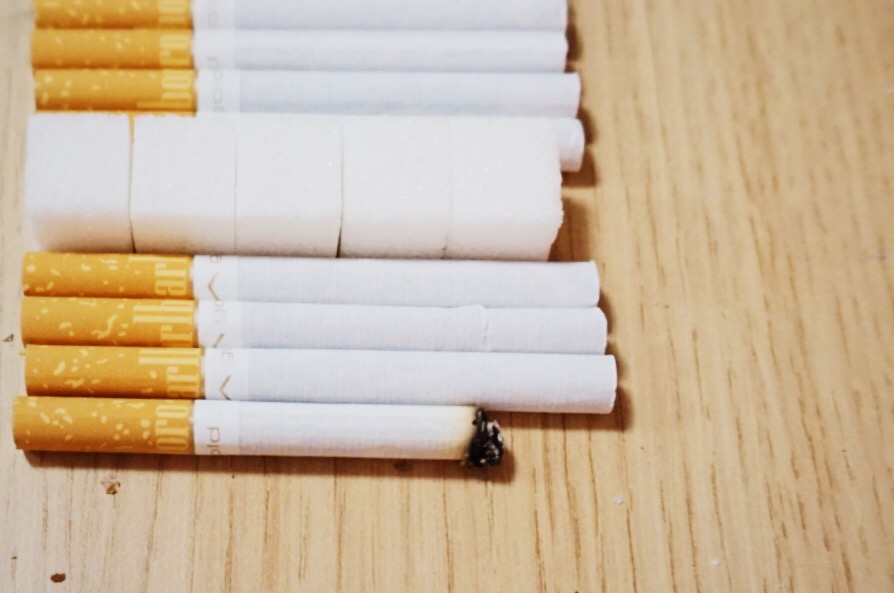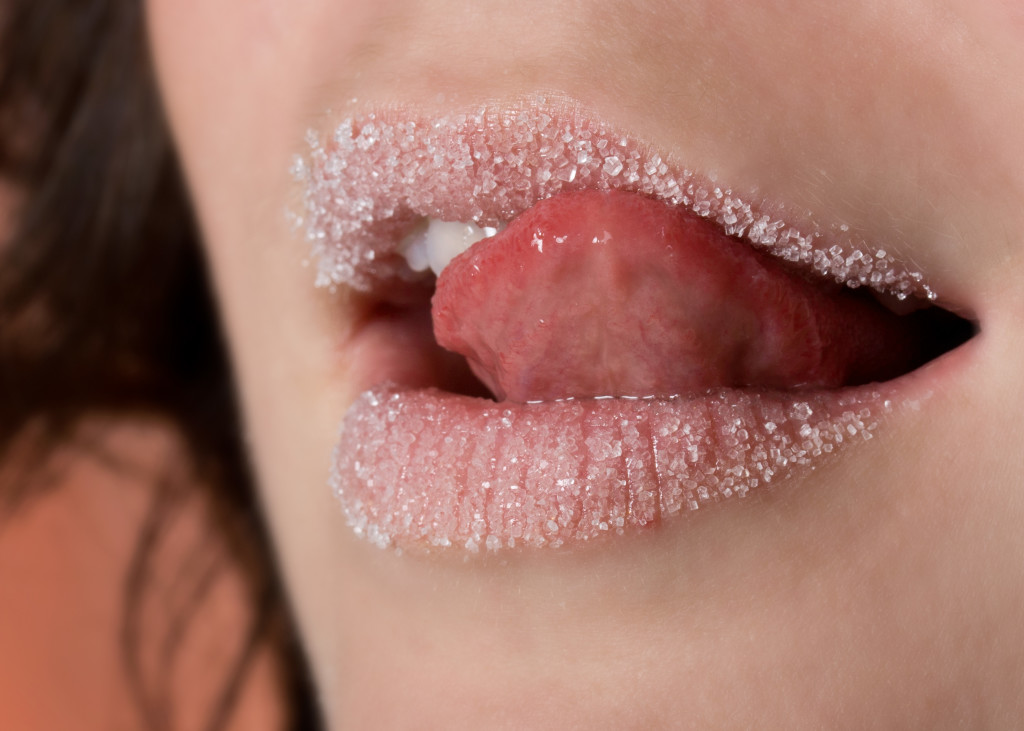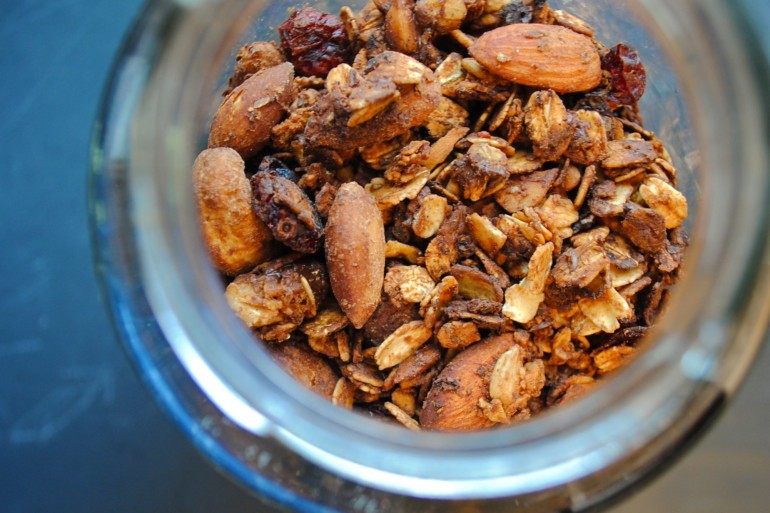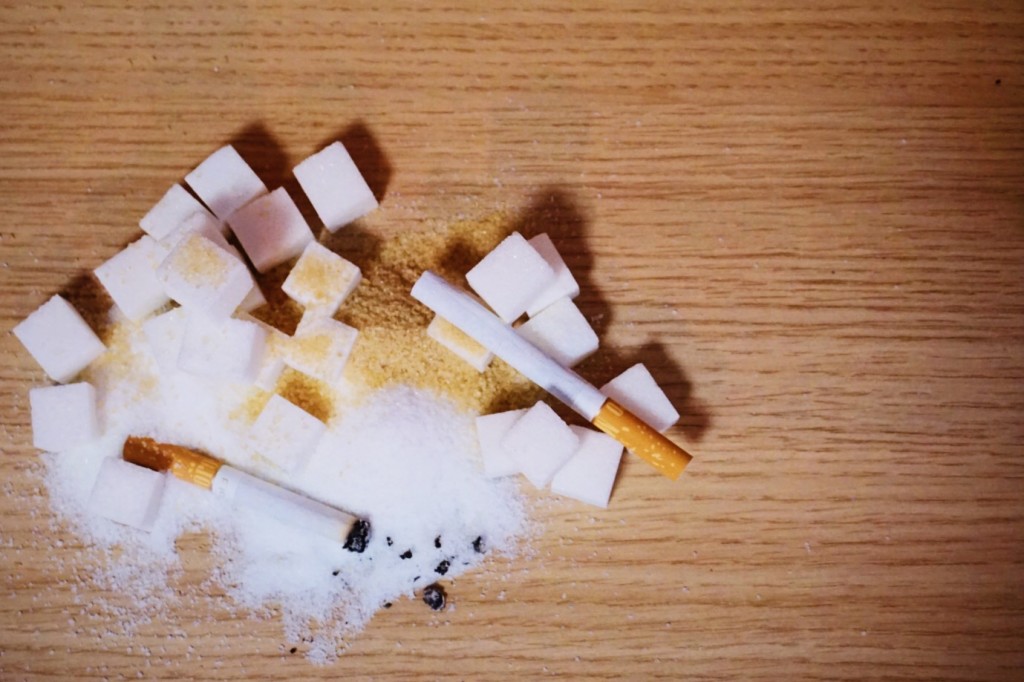Eat less, exercise more. A calorie is a calorie. Everything in moderation. That’s what everyone tells you to do.
What if I were to tell you that these tips on “healthy living” were wrong? That perhaps exercise is not the key to losing weight, or not all calories are created equal.
Recently, research has shown that processed sugar, an ingredient in 80% of our grocery store items, could be the fuel to the United States’ top two causes of death, heart disease, and cancer. Sugar, the thing we sprinkle on our coffee and the reliable cure to our heartbreak, is now directly linked to these diseases, which are more common than chronic respiratory disease, the product of smoking tobacco. Before you begin to shout obscenities at me, read on and learn a bit about the poison that is sugar.
Sugar as a Toxin

Photo by Jen Hayashi
We’ve always grown up learning that too much sugar is unhealthy, but in moderation it’s fine. But bear with me as I explain how your body processes a calorie of processed sugar and you may end up changing your mind.
Whether the sweetener is high-fructose corn syrup, white sugar, brown sugar, honey, or any other sweetener, it is composed of glucose and fructose. When eaten, glucose acts as the energy source for all of our cells, allowing us to function.
On the other hand, fructose is sent solely to our liver. When there’s too much of it, it immediately gets turned into fat. When this occurs over and over again insulin levels rise, fat accumulates in the liver and blood, and the likelihood of obesity, diabetes, and cancer increases. Now before you say, “Oh well, I just won’t go over that fructose limit…“ or “Everything causes cancer,” let me go over a couple more facts.
In March 2015, the World Health Organisation recommended that individuals should not be consuming more than 6 teaspoons of sugar a day; as of today, the average American eats 22 teaspoons of sugar a day and over 50% are consuming more than 53 per day. It’s safe to say the average liver is constantly over its fructose limit.
As for the cancerous aspect, it is widely-accepted that high levels of insulin and obesity increase one’s chances of malignant cancer. And it makes sense, because as the world’s sugar consumption has increased over the past decades, so have the staggering rates of cancer.
Now some of you may be thinking, “Oh but I’m thin, not obese, and don’t have diabetes.” But if your diet consists of excess sugar, you’re still prone to these diseases due to visceral fat, a dangerous fat surrounding the abdominal organs that doesn’t always expose itself.
At this point some of you may think I’m being overdramatic. And believe me, as a sweets addict myself, these are not facts I like to hear either. However, these statistics are very real and it’s the heavy shock of it all that makes it sound like an exaggeration. But if it’s at all possible that we can reduce the risk of the world’s most lethal problems by simply cutting down on sugar, why not?
Sugar as a Mind-Game

Photo courtesy of Jeanny on flickr.com
Some of you probably clicked on this link after seeing the words sugar and tobacco, a drug whose industry was demonized for being addictive and extremely unhealthy. Well we’ve already learned of sugar’s adverse effects on one’s health, but there’s no way we can be addicted to sugar. We can all quit whenever we want to. Right?
One study recently examined rats and their preference between cocaine and sugar. 94% of the time, sugar proved more addictive than cocaine. And when we look at the neuroscience behind sugar in the brain, it’s actually not too surprising.
When humans even see sugar, our brain gets a rush of dopamine, a neurotransmitter in the brain associated with pleasure and taking action towards these pleasurable rewards. Then, when we eat sugar, our natural opioids and beta-endorphins rush to the brain, similar to someone on cocaine or heroin. Talk about a sugar high. So if sugar induces the same addictive pathways as harmful illegal substances, why are we denying our addiction to this everyday crystal and why are we not taking it seriously?
Sugar as… Everything

Photo courtesy of Lauren Kaplan
Processed sugars are everywhere. Besides some of the obvious culprits like soda and candy, it’s hidden in our granola, yogurt, condiments, bread, milk, and other “healthy” foods.
One recent documentary had Damon Gameau, a previously sugar-avoidant healthy male, on a diet of “healthy” foods that included the amount of processed sugar the average teenage male consumes per day. In just one month, Damon gained 18 pounds, accumulated noticeable visceral fat, and developed dangerous levels of fat in the blood and liver. Aside from physical aspects, Damon felt lethargic, mentally foggy, and constantly craving “hits” of sugar to keep him going. This is all in just one month, from what society tells us are “healthy” foods.
Well, now what?

Photo by Jen Hayashi
What I don’t want to do, and what the food industries and government are trying to do, is tell you that it’s your fault. This is how big companies like Coca-Cola get by with making billions of dollars off of a product they know people are addicted to. Industry giants fund their own sugar research and blame their customers’ lack of exercise and self-control for the obesity epidemic. Even companies selling bread and soup, products where sugar has no right to be, prey on their customers by adding sugar to their products to make them more irresistible.
It is not our fault that these companies are willing to sacrifice our health for their profit.
I’m not telling you to cut sugar out completely, as it’s hard not to go insane when it constantly surrounds and taunts us. But what I am encouraging is a change of perspective on processed sugar and its role in our everyday life.
Should we treat a cupcake as just one cigarette? Should we eat a donut with the acknowledgement that it can lead to addiction, health problems, and even death? Should we put warning labels on our sodas and candy bars? Who knows. But the not-so-sweet truth of it is that sugar is a toxic poison that we need to think twice about before taking our next “hit.”

